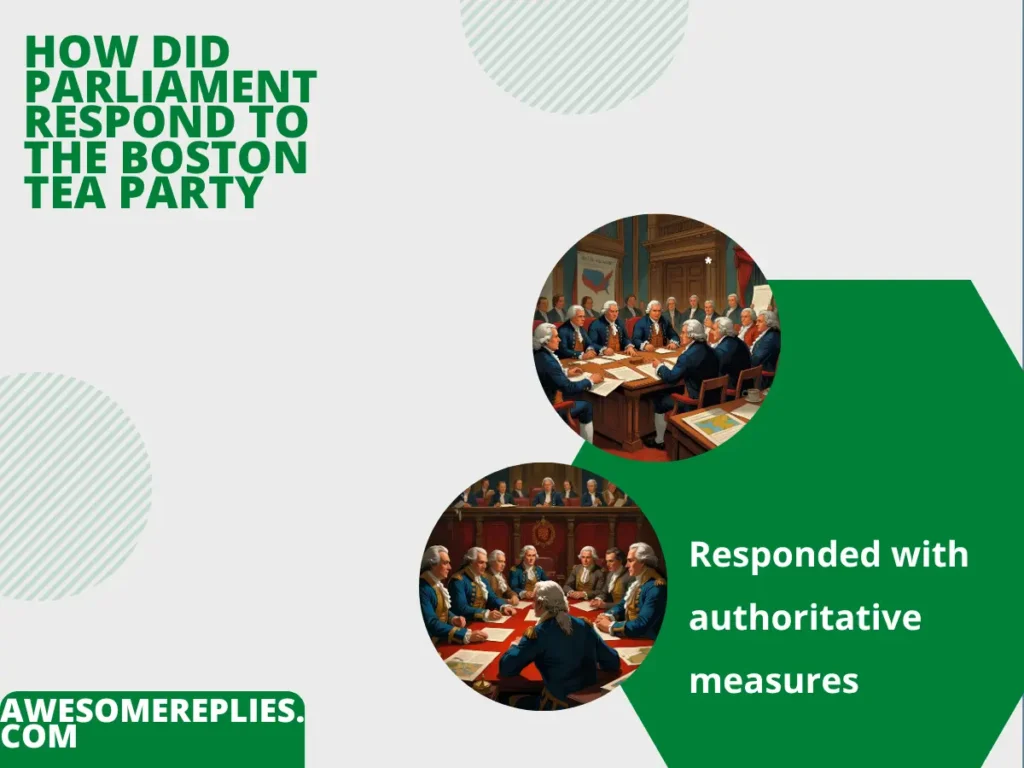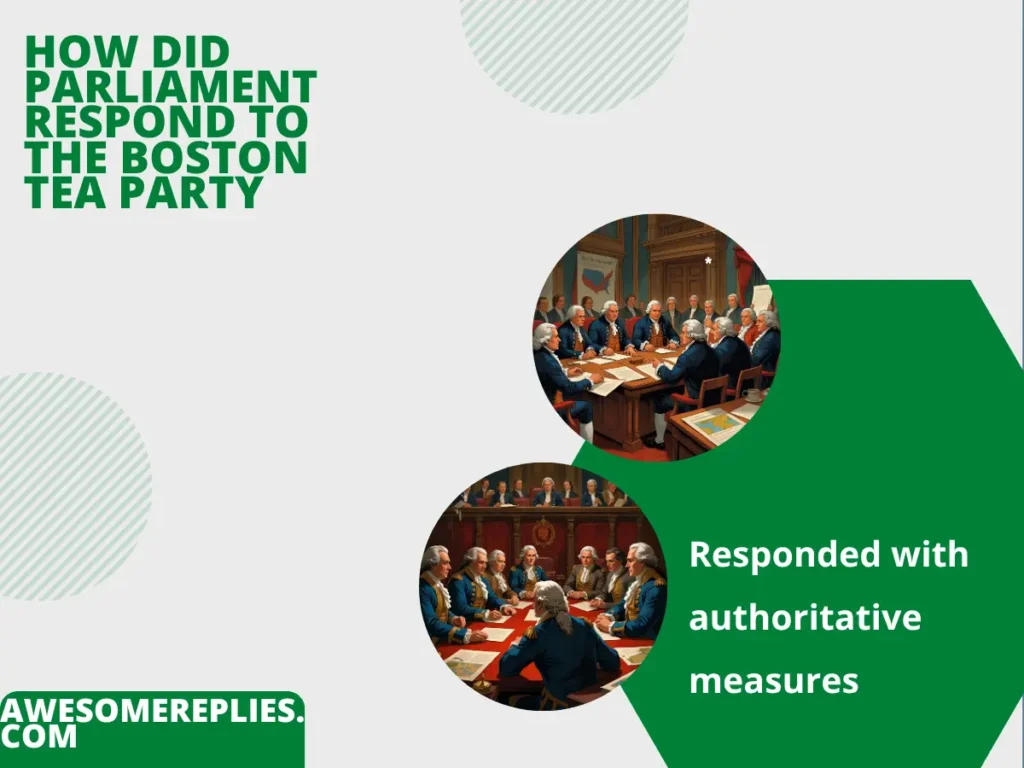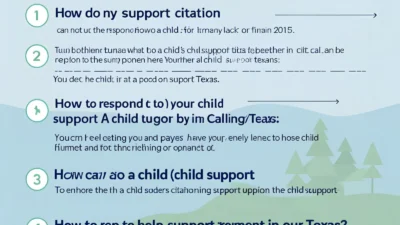Are you searching for the perfect way to describe how Parliament responded to the Boston Tea Party? Look no further!
This article provides a clear, detailed exploration of the various ways to express this historical reaction, tailored to different contexts.
Whether you need formal terms for academic writing, casual phrases for conversations, idiomatic expressions for creative flair, or professional language for workplace settings, we’ve got you covered.
Understanding the diverse ways to articulate Parliament’s response will help you communicate effectively in any situation.
Formal Ways to Say How Parliament Responded to the Boston Tea Party

When writing essays, reports, or historical analyses, precise and formal language is key. Below are over 30 formal alternatives to describe Parliament’s reaction to the 1773 Boston Tea Party, where colonists dumped tea into Boston Harbor to protest British taxation.
- Enacted punitive legislation
- Imposed retaliatory measures
- Instituted coercive acts
- Responded with legislative reprisals
- Passed restrictive laws
- Enforced stringent policies
- Implemented disciplinary actions
- Authorized repressive statutes
- Promulgated punitive decrees
- Established harsh regulations
- Issued severe sanctions
- Enforced disciplinary edicts
- Legislated retaliatory policies
- Instituted severe penalties
- Responded with authoritative measures
- Enacted corrective laws
- Imposed strict governance
- Authorized punitive resolutions
- Passed oppressive legislation
- Established restrictive mandates
- Enforced rigorous controls
- Responded with statutory reprisals
- Instituted disciplinary ordinances
- Promulgated severe directives
- Enacted authoritarian laws
- Imposed regulatory sanctions
- Authorized restrictive decrees
- Passed coercive statutes
- Established punitive frameworks
- Responded with legislative crackdowns
- Enforced stringent mandates
- Instituted repressive policies
Informal Ways to Say How Parliament Responded to the Boston Tea Party

In casual conversations, you might want simpler, relatable phrases. Here are over 30 informal ways to describe Parliament’s reaction, perfect for chats with friends or informal settings.
- Cracked down hard
- Got tough on the colonists
- Threw the book at them
- Hit back with rules
- Laid down the law
- Came down like a hammer
- Got strict with Boston
- Put their foot down
- Slapped on tough laws
- Tightened the screws
- Dropped harsh rules
- Got even with new laws
- Clamped down fast
- Made things strict
- Threw out tough orders
- Got rough with policies
- Cranked up the rules
- Pushed back hard
- Made life tougher
- Slapped on strict laws
- Got serious with Boston
- Laid out harsh terms
- Cracked the whip
- Set tough new rules
- Hit them with laws
- Got firm with orders
- Put down strict rules
- Made things tight
- Threw down tough laws
- Got hard on the colonists
- Rolled out strict policies
- Came at them with rules
Idiomatic Ways to Say How Parliament Responded to the Boston Tea Party
Idiomatic expressions add color and flair to your language. These 30+ idioms capture Parliament’s reaction in a vivid, creative way, ideal for storytelling or engaging discussions.
- Lowered the boom
- Brought down the hammer
- Tightened the noose
- Threw down the gauntlet
- Put the screws to them
- Came down hard
- Dropped the hammer
- Turned the heat up
- Laid down the gauntlet
- Cracked the whip
- Put their foot down
- Threw a curveball
- Pulled no punches
- Turned the screws
- Brought the hammer down
- Got in their face
- Played hardball
- Drew a line in the sand
- Threw the book at them
- Put the squeeze on
- Came out swinging
- Dropped a bombshell
- Got their dander up
- Laid it on thick
- Hit them where it hurts
- Put up a brick wall
- Threw a hard punch
- Got their back up
- Dropped the gauntlet
- Came down like a ton of bricks
- Put the clamps on
- Gave them a rough ride
Professional Ways to Say How Parliament Responded to the Boston Tea Party
In workplace settings, such as emails, presentations, or reports, you need polished yet approachable language. Here are over 30 professional phrases to describe Parliament’s response, suitable for meetings or written communication.
- Implemented corrective measures
- Enacted regulatory policies
- Established disciplinary protocols
- Issued formal sanctions
- Promulgated strict regulations
- Authorized legislative actions
- Instituted governance reforms
- Enforced statutory measures
- Passed disciplinary legislation
- Responded with regulatory controls
- Imposed formal penalties
- Established authoritative policies
- Enacted structured reprisals
- Issued legislative directives
- Instituted formal ordinances
- Promulgated regulatory frameworks
- Authorized disciplinary resolutions
- Enforced governance mandates
- Responded with statutory policies
- Implemented legislative sanctions
- Established corrective statutes
- Issued regulatory edicts
- Enacted formal decrees
- Instituted disciplinary guidelines
- Promulgated authoritative mandates
- Authorized regulatory reprisals
- Enforced structured policies
- Responded with legislative measures
- Implemented formal controls
- Established statutory directives
- Issued disciplinary frameworks
- Enacted governance protocols
Conclusion
Choosing the right phrase to describe how Parliament responded to the Boston Tea Party depends on your audience and context.
Formal terms suit academic or official settings, while informal phrases work for casual chats. Idiomatic expressions add creativity, and professional language fits workplace communication.
By using these varied expressions, you can convey historical events with precision and flair.
Practice these phrases to make your communication clear, engaging, and context-appropriate.




